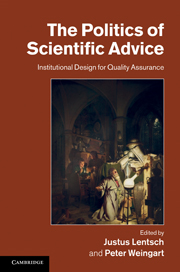Book contents
- Frontmatter
- Contents
- List of figures
- List of tables
- Acknowledgements
- Biographical notes
- Part I Methodological issues: quality control and assurance in scientific policy advice
- Part II Collegial science advisory bodies
- Part III Collegial science policy advisory bodies
- Part IV Research-based advisory organisations
- Part V Academies of science
- 17 Scientific advice for policy in the United States: lessons from the National Academies and the Former Congressional Office of Technology Assessment
- 18 Quality control in scientific policy advice: the experience of the Royal Society
- 19 European Academies Science Advisory Council (EASAC)
- 20 Quality control in the advisory process: towards an institutional design for robust science advice
- Index
18 - Quality control in scientific policy advice: the experience of the Royal Society
Published online by Cambridge University Press: 25 October 2011
- Frontmatter
- Contents
- List of figures
- List of tables
- Acknowledgements
- Biographical notes
- Part I Methodological issues: quality control and assurance in scientific policy advice
- Part II Collegial science advisory bodies
- Part III Collegial science policy advisory bodies
- Part IV Research-based advisory organisations
- Part V Academies of science
- 17 Scientific advice for policy in the United States: lessons from the National Academies and the Former Congressional Office of Technology Assessment
- 18 Quality control in scientific policy advice: the experience of the Royal Society
- 19 European Academies Science Advisory Council (EASAC)
- 20 Quality control in the advisory process: towards an institutional design for robust science advice
- Index
Summary
Introduction
Academies around the world are increasingly in the business of giving advice to policymakers. They do this in order to influence policy outcomes. Quality management in this context is therefore about ensuring that influence is actually achieved. It is not primarily, or at least not only, about avoiding factual error. Avoiding factual error is, of course, a prerequisite for a national science academy that seeks to embody the cream of the nation's science. But there's more to influencing policy than that.
Quality management has to embrace process as much as final output, since process is a key determinant of credibility and credibility, in turn, is central to influence. Particularly on issues that arouse public interest, public perceptions about the credibility of the adviser affect how readily the policymaker can embrace the advice being offered. Credibility depends both on the overall reputation of the organisation and on how the particular project is carried out. In the current climate in Western democracies there is a premium on openness (including consultation with a range of stakeholders) and transparency. This may be challenging for an academy more used to technical debate with experts. It is not always easy for an intrinsically elite body also to be inclusive and accessible.
- Type
- Chapter
- Information
- The Politics of Scientific AdviceInstitutional Design for Quality Assurance, pp. 334 - 341Publisher: Cambridge University PressPrint publication year: 2011
- 3
- Cited by



